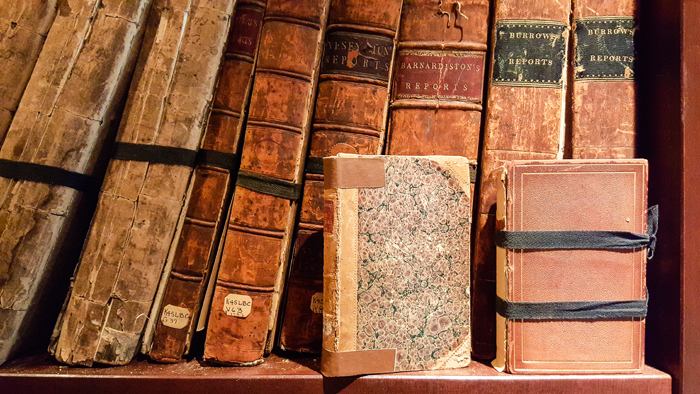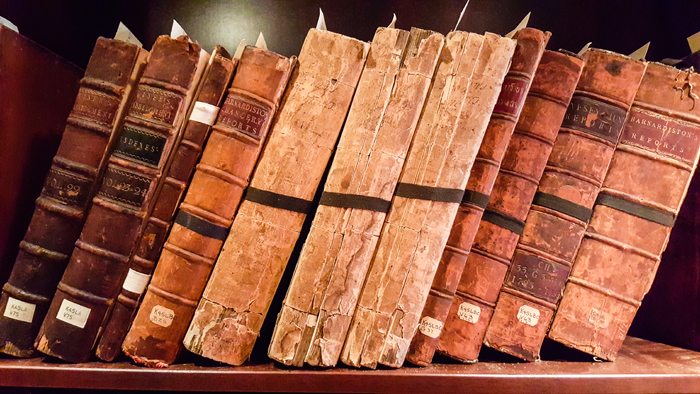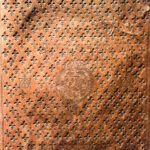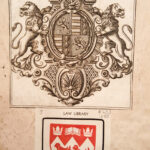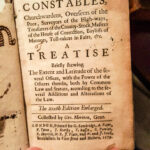
The Peter M. Laing Rare Books and Special Collections Room at the Nahum Gelber Law Library houses a number of special volumes, many of which are virtual works of art.
The Gelber Law Library’s esteemed Wainwright Collection was first established in 1958 with the acquisition of several hundred volumes dedicated to the history of French law.
The collection is primarily composed of early French jurists on general Civil Law before the Codification of 1804 and was the personal library of French legal historian François Olivier-Martin. At the time of its acquisition, it was considered one of the most comprehensive private law libraries in France.
The books were shipped from Paris to Le Havre and then to Montreal in six crates aboard the S.S. Montreal. Upon their arrival, they were sorted and shelved in a special room on the third floor of Old Chancellor Day Hall. This room, the Wainwright Room, was so named in acknowledgement of McGill Law graduate Arnold Wainwright, BA1899, BCL1902, who taught at the Faculty for a quarter century and who bequeathed his estate to the Faculty upon his death in 1967.
In the 1980s, the Wainwright Fund evolved to allocate an annual amount of money to be dedicated to continue to acquire volumes for the Fund. These acquisitions have allowed the library’s collection to move beyond the class vision of civil law, centred on France, to reflect the global influence of civil law across languages and continents.
Click images to view in full. You can also watch a video of the collection for some rare book eye candy.
Today, it consists of 800 works comprising 1,200 volumes and is conserved in controlled atmospheric conditions in the Peter M. Laing Room of the Gelber Library.
The collection’s physical presence provides fascinating insight into how technology has shaped, and is continuing to shape, the legal profession. Access to information, which could also be considered access to insight, underpins the study of law, and these rare books are a tangible — and beautiful — reminder of how that information was collected, contained and passed on.
Digital technology has changed the playing field, Gelber Head Librarian Daniel Boyer notes.
“In many ways, computers have democratized the practice of law,” Boyer says. “When I was practicing law, the big firms had access to what we call a jurisprudence occulte that less-endowed jurists didn’t have access to. Now, if they have a QuickLaw or SOQUIJ password, everybody has access to the same pool of resources.”
A lawyer by training who obtained a degree in Library Science from McGill, Boyer designed a course in the 1990s for the National Judicial Institute to help judges understand and make the best use of computer-assisted legal research. He opened the course showing his pupils — the judges — a side-by-side comparison of the print version and CD-ROM version of a dictionary (Oxford English Dictionary for the Anglophones and the Grand Robert for the Francophones).
“When these tools were paper-based, it was fairly uni-dimensional because you looked up words according to the alphabet,” Boyer explains. “In a database, we have all the articles from all the law journals, and I can see the word I am looking up, used in context.”
The result: an immediate broadening of perspective thanks to a simple restructuring of how information is presented. This is what makes access to technology so powerful, Boyer argues. “The big challenge, whether you are a first-year law student or a Supreme Court judge, is characterization, or, in French, qualification. Using dictionaries to define legal concepts is a very helpful part of that process.”
The demonstration impressed the judges, and Boyer also took the opportunity to point out the impact computers would have on people’s daily lives.
“As judges and lawyers, we have to understand the impact the digital evolution has on society.”
